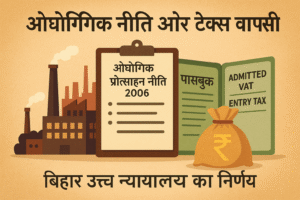The Patna High Court, in a 2021 oral judgment, addressed a common situation under the Essential Commodities Act: a vehicle seized during a raid on alleged public distribution system (PDS) diversion, but no timely confiscation proceedings. The writ petitioner had approached the Court seeking release of a pick-up van seized in connection with a police case registered under Section 7 of the Essential Commodities Act, 1955. The Court streamlined the path forward by fixing responsibility on the District Collector to take a prompt, lawful decision and, where appropriate, to enable the jurisdictional Magistrate to consider release.
The background was straightforward. Based on an official’s written report dated 21.08.2018, a First Information Report (FIR) was registered as Rajepur P.S. Case No. 130 of 2018 under Section 7 of the Essential Commodities Act. Acting on a tip-off, officials and police conducted a raid at the petitioner’s premises and seized a pick-up van (Reg. No. BR05GA8629) carrying 37 bags of rice, suspected to be government foodgrains intended for black-marketing.
Crucially, even after the seizure, no confiscation proceeding had been initiated by the authorities. This was officially confirmed through a letter dated 07.06.2019 (letter no. 2040/legal), which stated that no confiscation case was pending or ongoing in respect of the seized vehicle. The petitioner had also moved an application before the Sub-Divisional Judicial Magistrate, East Champaran at Motihari, for release of the vehicle.
In Court, the petitioner urged that the writ application be disposed of in terms of the ratio in Bablu Kumar Das v. State of Bihar, Cr. WJC No. 246 of 2016 (order dated 13.05.2016). The State did not object to this course. Taking note of this consensual position, the High Court disposed of the matter in line with the earlier precedent.
The operative directions are the heart of the ruling. First, the Court partly allowed the writ and directed the District Collector, East Champaran at Motihari, to take a decision “in accordance with law” within two weeks from receipt of the Court’s order. Second, the Court set out a conditional pathway: (i) if confiscation is warranted, the Collector must promptly initiate confiscation proceedings and then decide on release or otherwise based on the outcome; (ii) if the Collector decides not to initiate confiscation, that decision must be communicated to the jurisdictional Judicial Magistrate, who would then have the power to consider and direct the release of the vehicle, if facts and circumstances so warrant. This neatly avoids indefinite retention of property during investigative delays and places accountability on the proper authority.
The Court’s approach balances competing concerns. On one side are allegations of diversion of government foodgrains—a serious issue that undermines the public distribution system and invites rigorous enforcement under the Essential Commodities Act. On the other side is the individual’s proprietary interest in the vehicle and the right to avoid needless loss through prolonged seizure without lawful confiscation proceedings. By anchoring the relief in the Bablu Kumar Das framework and fixing a firm outer limit (two weeks) for administrative decision-making, the Court prevents the process from becoming the punishment.
For litigants and officials alike, the judgment clarifies that seizure cannot remain in limbo. Either the confiscation process begins promptly, or—if the administration decides not to proceed—the criminal court of first instance (here, the jurisdictional Judicial Magistrate) becomes the locus for deciding release. This is especially useful where goods and vehicles depreciate quickly or are essential for livelihood. It also underscores a consistent judicial message: while the State may seize property to enforce essential commodity controls, it must follow the law with diligence and without delay.
The case was heard and decided by a single-judge Bench (Hon’ble Mr. Justice Prabhat Kumar Singh) on 04-02-2021. Appearances included counsel for the petitioner and the State (Standing Counsel), reflecting the straightforward and uncontested nature of the relief—disposal in terms of the earlier coordinate bench’s order in Bablu Kumar Das. The Court concluded by disposing of the writ petition with these directions.
Overall, the ruling exemplifies a practical, rights-sensitive approach for EC Act seizure cases where the State has not initiated confiscation. It reduces uncertainty, compels timely administrative action, and respects judicial oversight where confiscation is not pursued.
Significance or Implication of the Judgment (For general public or government)
This decision matters beyond the facts of one seizure:
- It sets a clear administrative timeline. The District Collector must act within two weeks—avoiding open-ended holding of vehicles and goods.
- It defines the procedural fork: begin confiscation and decide release based on its result, or, if not confiscating, notify the Magistrate so that the criminal court can consider release on merits.
- It safeguards livelihoods by reducing economic loss from prolonged seizure of commercial vehicles used for daily income.
- It promotes better governance: enforcement agencies must either prosecute confiscation cases diligently or step aside for judicial consideration of release.
- For the public distribution system, it ensures suspected diversion is addressed lawfully, without compromising due process.
For officials, the message is to document reasons and timelines. For citizens, it reinforces that legal remedies are available if property is held without timely confiscation proceedings.
Legal Issue(s) Decided and the Court’s Decision with reasoning
- Whether a seized vehicle can be kept indefinitely without initiation of confiscation proceedings under the Essential Commodities Act.
Decision: No. The Court directed a time-bound administrative decision and a structured process: either initiate confiscation and decide release based on the outcome, or, if not initiating, communicate the decision to the jurisdictional Judicial Magistrate for consideration of release. Reasoning: Aligns with earlier precedent (Bablu Kumar Das) and ensures action “in accordance with law” within two weeks. - Who has authority to order release when confiscation is not pursued.
Decision: The jurisdictional Judicial Magistrate. Reasoning: Upon the Collector’s decision not to initiate confiscation, the Magistrate “would, thereafter, stand vested with the power to direct release,” based on case circumstances. - Appropriate relief when both sides agree to disposal in terms of a prior coordinate bench order.
Decision: Dispose of the writ in terms of the earlier order (Bablu Kumar Das). Reasoning: Both parties did not object, and the prior ratio provides a workable, lawful template for timely decisions.
Judgments Referred by Parties (with citations)
- Bablu Kumar Das v. State of Bihar, Cr. WJC No. 246 of 2016, order dated 13.05.2016 — urged by the petitioner for disposal on similar terms.
Judgments Relied Upon or Cited by Court (with citations)
- Bablu Kumar Das v. State of Bihar, Cr. WJC No. 246 of 2016, order dated 13.05.2016 — writ disposed in terms of this precedent.
Case Title
Petitioner v. State of Bihar & Ors. (generic styling to avoid personal identifiers)
Case Number
Civil Writ Jurisdiction Case No. 25572 of 2019.
Citation(s)
2021(2) PLJR 320
Coram and Names of Judges
Hon’ble Mr. Justice Prabhat Kumar Singh.
Names of Advocates and who they appeared for
- Mr. Karandeep Kumar — for the petitioner.
- Mr. Arvind Ujjwal (SC-4) — for the State.
Link to Judgment
MTUjMjU1NzIjMjAxOSMxI04=—am1–AJp3RL4oeQ=
If you found this explanation helpful and wish to stay informed about how legal developments may affect your rights in Bihar, you may consider following Samvida Law Associates for more updates.








